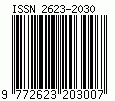ZONA EKONOMI EKSLUSIF (ZEE) DALAM POROS MARITIM DAN TOL LAUT
DOI:
https://doi.org/10.33556/jstm.v0i1.183Abstract
in Indonesia is a region bordering the sea region of Indonesia determined by the law which included sea bed, land under it and water above it with the limit of 200miles. This is measured from Indonesian line of the sea.This whole time a lot of people see the shoreline as the sea border. This perspective makes us alienated and lack of knowledge to take advantage of the sea. This understanding also conjures the idea sea toll, to confirm that Indonesia is maritime country. Sea toll means building sea transportation with ships or sea logistic system which will serve nonstop back and forth from Sabang to Merauke. One of the factors to support this is by building ports (deep sea port) order to give faraway to big ships. A course that spreading as far as 5,000 kilometers or an eighth circumference of the earth One of the purposes of sea toll is to move the economy as efficient and evenly as possible. With the hope that, there will be ships back and forth on Indonesian water, so logistics cost will be cheap. That is why; sea toll is one of President Joko Widodo’s priorities which are also meant to develop Indonesia as maritime country and develop Indonesia as national unity. In addition sea toll can also be affirmation, that Indonesia is in every regions even if it is through ships.
Keywords : Exclusive Economic Zone (ZEE) , Sea Toll , The Shaft Maritime, A Seaport
Downloads
Published
Issue
Section
License
Authors who publish with this journal agree to the following terms:Authors retain copyright and grant the journal right of first publication with the work simultaneously licensed under a Creative Commons Attribution License that allows others to share the work with an acknowledgement of the work's authorship and initial publication in this journal.
Authors are able to enter into separate, additional contractual arrangements for the non-exclusive distribution of the journal's published version of the work (e.g., post it to an institutional repository or publish it in a book), with an acknowledgement of its initial publication in this journal.
Authors are permitted and encouraged to post their work online (e.g., in institutional repositories or on their website) prior to and during the submission process, as it can lead to productive exchanges, as well as earlier and greater citation of published work (See The Effect of Open Access).







